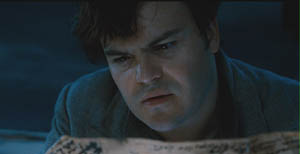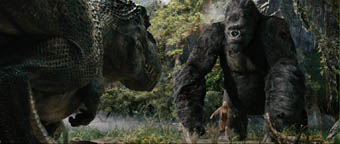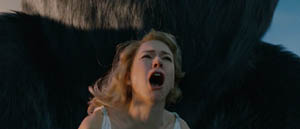|
 So after the worldwide, record-setting success of his theatrical Lord of the Rings trilogy, Peter Jackson asked if he could spend as much money as existed in the world, and indeed perhaps a touch more, on his next project, and was answered with a resounding "Yes, and might we add, Hoorah!" from the studio. So that, in a nutshell, is what he then did: make what has to be the most grandiose, expensive-looking film in the history of film, including his own most recent efforts. King Kong is a great big boy's movie, a film that takes the "let's have an adventure" attitude of the old film thrillers and adds to it not only a sense of realism via the stunningly realized special effects, but a sense of honest human drama by making its human characters almost as important as the big ole' gorilla. Almost, because the film is named for said gorilla, after all. He's the one we really need be watching.  Unlike the 1970s Dino De Laurentis remake, Jackson's Kong remains set in the 1930s. This is in many ways a boon to the film, not only for the atmosphere, but also for acheiving a sense of believability. The idea of an island that no one knows the exact location of doesn't quite fly in today's age of satellite navigation, but more than that, the idea of an island populated by giant apes, giant bugs, dinosaurs, and other sundry critters in an ecosystem that would collapse in record time is one that most modern films wouldn't attempt to depict simply as-is. There would be some seemingly obligatory explanation, be it reasonably good or impossibly contrived, to explain just how Skull Island manages to support its exotic menagerie. Old adventure flicks didn't bother with such extraneous and frankly boring crap, and neither does Peter Jackson, who knows, doubtlessly from personal inclination, that the audience wants excitement and thrills and to look at Naomi Watts, and not some rambling and utterly made-up biology lesson. They want to see Kong beat the shit out of two T-Rexes at once, and so Jackson gives us three T-Rexes. Why stop short? This is a film about having a good time. Kong himself is an amazing acheivement, a CG creature that really does make us believe that we're watching a flesh-and-blood being. Though he may seem menacing in the beginning (or the middle, as the ape doesn't show his face until nearly a third of the way in), Kong is first and foremeost played not as a monster, but as an animal, and a smart animal, to boot. Portrayed (via motion-capture technology) by Andy Serkis of Gollum fame, the gorilla seems more alive than any previous attempt at simulating an existing, non-fantasy animal; it's pretty clear that Serkis spent a great deal of time watching footage of real gorillas to prepare for the role. As a result, Kong is completely sympathetic to the audience, or at least any audience member with a shred of human feeling, and there's never any doubt, especially when the giant ape is forcibly brought to New York as an attraction for the public's delight, just whose side we should be on.  What then of the human characters? They do have a tough act to follow, even if they do get a head start, but the movie gives us plenty of time to get involved with their own dramas before the show is utterly stolen. (It also makes Skull Island, by contrast to the gritty Depression-era New York, that much creepier.) Naomi Watts, a first-rate talent who has never looked better, is able to snare our loyalties right from the get-go, but Jack Black's Carl Denham, filmmaker and ape-napper extraordinaire, starts out being the one the viewer can admire and appreciate and slowly dribbles that allegiance away as the story moves on. By the end, you're really wanting to see him ending up wedged firmly between Kong's toes, since we all know how it's going to end. Watts pulls off an amazing sense of contagious empathy towards Kong, which is all the more amazing considering she was having to act to empty air the entire time, while Black gives us a charming, hoodwinking rapscallion who slowly reveals the selfish, hollow glory-chaser underneath. (There's also an amusing bit early on where he has the kidnapped screenwriter on his film literally living in an animal cage in the bowels of the ship, a bit of satire that seems, as the story progresses, less like a joke and more like what Denham actually seems to think he's owed by the world.) At over three hours, the film is, all things considered, a wee bit too long for a film about a giant gorilla on the loose, though it's hard to say what should've been cut or trimmed. At some points, the extended moments of reverie make it feel like Jackson doesn't ever plan to end the movie. Maybe that was, in some ways, his plan in a sense. After all, anyone who isn't shouting for Denham and the military to "just leave that poor monkey alone!" by the time the air assault begins are either part of the roughly two percent of humans who are aware that gorillas aren't monkeys, or are just heartless bastards who have never owned a pet and haven't seen just how much of ourselves is apparent in the animal world. Maybe he wanted to put off the inevitable moment of sadness as long as he could, or maybe he just got so used to indulging himself on Lord of the Rings that he's unable to restrain himself anymore. But this matter aside, it's quite indicative of his talent as a filmmaker that he can take an old monster movie and remake it into a film that's actually about humanity, without even the obvious crutch of allying our sympathies with a human. In this sense, King Kong is a resounding success. It may not be perfect, but it's clear that it was made by somone who loved the hell out of what he was doing. -review by Matt Murray
|
|
||||||||